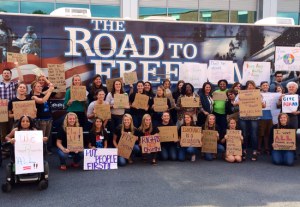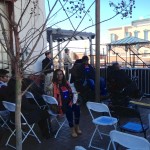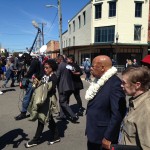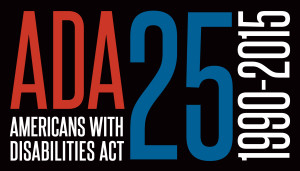In a collaborative effort, 15 local organizations have arranged for an ADA Legacy Tour Bus stop in Mid-Missouri to create awareness and celebrate the 25thanniversary of the Americans with Disabilities Act (ADA). This tour is one in a series of monthly events the group has planned to create excitement for ADA25. The Legacy Bus Tour is part of the ADA Legacy Project to “Preserve the Past, Celebrate the Present and Educate the Future”. The Tour includes:
 The “Road to Freedom” ADA Bus – which traveled to 48 states in 2007 to raise support for the ADA Amendments Act – courtesy of the Disability Rights Center and driven by veteran disability rights photographer, Tom Olin;
The “Road to Freedom” ADA Bus – which traveled to 48 states in 2007 to raise support for the ADA Amendments Act – courtesy of the Disability Rights Center and driven by veteran disability rights photographer, Tom Olin;- A four-panel display on the history of self-advocacy, courtesy of the Museum of disABILITY History;
- Displays on The ADA Legacy Project and its effort to preserve of disability history; celebrate disability history milestones; and educate future generations of disability advocates;
- A “Because of the ADA . . .” booth where you can post your thoughts and photos to illustrate the difference the ADA has made in your life;
- The ADA quilt – add your signature to thousands of others who have participated in the Tour;
- Displays on the history of the Road to Freedom Tour;
- An information table with handouts on The ADA Legacy Project and the ADA, plus information from our partners and sponsors; and
- Events, workshops, artifacts, and other programming provided by local hosts. [Read more…]















